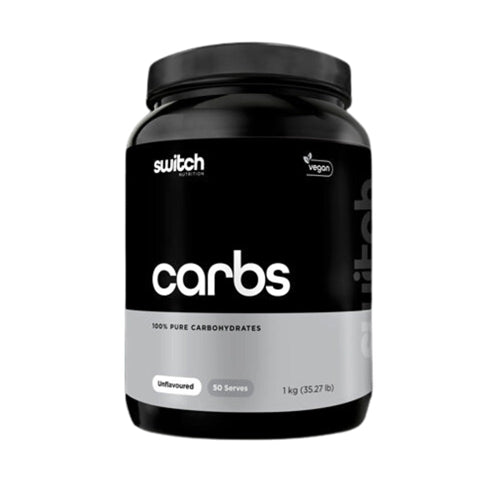
Switch Nutrition | Carbs
- In stock, ready to ship
- Backordered, shipping soon
CARBOHYDRATES (Carbs) are one of the three (3) macronutrients needed to sustain life. They are also the preferred energy substrate of your skeletal muscles. Except for fibre they provide 4 calories per gram.
Generally, most people consume adequate levels of carbs in their diet. However, athletes, people with a high metabolism (Ectomorph), individuals trying to gain muscle/weight or physically active people may need to supplement with carbs around training or in addition to meals.
CARBS COME IN THREE (3) FORMS
- SIMPLE – sugars which are generally faster absorbed excluding fructose (slow).
- COMPLEX – longer chains of sugars joined together that are generally slower absorbed excluding maltodextrin (fast).
- FIBRE – provides gut health and microbiome energy but doesn’t contribute to muscle energy.
Carbs are given a score of 0-100 called GI (Glycaemic Index). The higher the number the faster the carb absorbs into the blood stream. Glucose has a GI of 100. This makes it the fastest absorbing carb.
For the most part you want the carbohydrates you eat from food during the day to be low GI. However, around training you may need to supplement with high GI carbs.
The best high GI carbs to supplement around training are glucose and maltodextrin because they are quickly absorbed, well tolerated and create a greater increase in insulin.
This boost in insulin helps create an anabolic muscle building state while increasing glycogen (muscle energy) recovery.
Insulin also helps increase the absorption of other nutrients and amino acids including Beta Alanine, Creatine, Citrulline, Glutamine etc.
Glucose and Maltodextrin are incredibly easily digested and absorbed so create very little, if any digestive issues. That said, if you are supplementing with simple carbs during training you should keep your solution to no greater than 7%. That means 7g of carbs per 100ml of water.
HOW TO USE
Consume 20 – 75g of carbs during or immediately after exercise to support exercise performance and recovery.
Consume 20 – 50g around meals to add additional calories for weight gain.
Be sure to increase water consumption with the addition of carbohydrates as they hold water intracellular and may leave your body dehydrated if you don’t simultaneously increase hydration.

